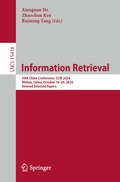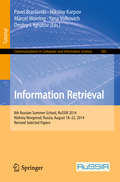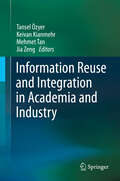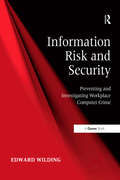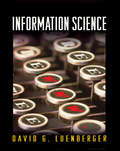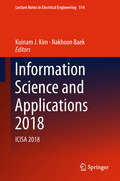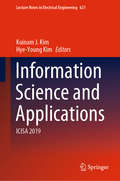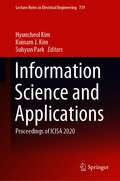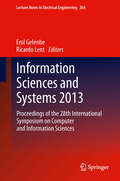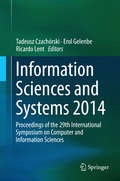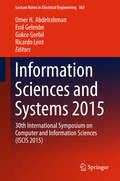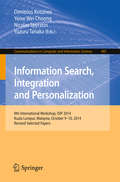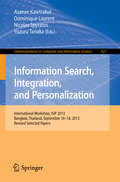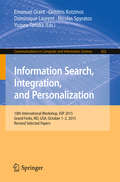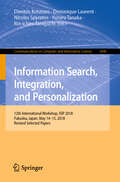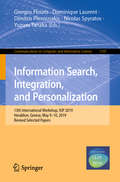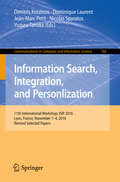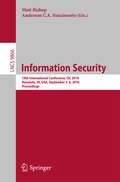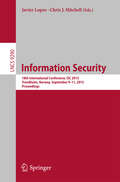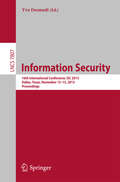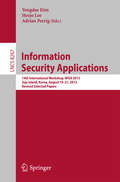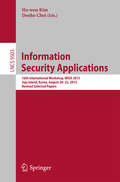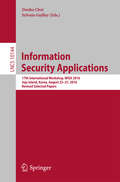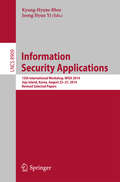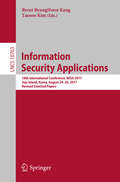- Table View
- List View
Information Retrieval: 30th China Conference, CCIR 2024, Wuhan, China, October 18–20, 2024, Revised Selected Papers (Lecture Notes in Computer Science #15418)
by Zhaochun Ren Xiangnan He Ruiming TangThis book constitutes the refereed proceedings of the 30th China Conference on Information Retrieval, CCIR 2024, held in Wuhan, China, during October 18–20, 2024. The 11 full papers presented in this volume were carefully reviewed and selected from 26 submissions. As the flagship conference of CIPS, CCIR focuses on the development of China’s internet industry and provides a broad platform for the exchange of the latest academic and technological achievements in the field of information retrieval.
Information Retrieval: 8th Russian Summer School, RuSSIR 2014, Nizhniy Novgorod, Russia, August 18-22, 2014, Revised Selected Papers (Communications in Computer and Information Science #505)
by Pavel Braslavski Yana Volkovich Dmitry I. Ignatov Nikolay Karpov Marcel WorringThis book constitutes the thoroughly refereed proceedings of the 8th Russian Summer School on Information Retrieval, RuSSIR 2014, held in Nizhniy Novgorod, Russia, in August 2014.The volume includes 6 tutorial papers, summarizing lectures given at the event, and 8 revised papers from the school participants.The papers focus on various aspects of information retrieval.
Information Reuse and Integration in Academia and Industry
by Tansel Özyer Jia Zeng Keivan Kianmehr Mehmet TanThe present work covers the latest developments and discoveries related to information reuse and integration in academia and industrial settings. The need for dealing with the large volumes of data being produced and stored in the last decades and the numerous systems developed to deal with these is increasingly necessary. Not all these developments could have been achieved without the investing large amounts of resources. Over time, new data sources evolve and data integration continues to be an essential and vital requirement. Furthermore, systems and products need to be revised to adapt new technologies and needs. Instead of building these from scratch, researchers in the academia and industry have realized the benefits of reusing existing components that have been well tested. While this trend avoids reinventing the wheel, it comes at the cost of finding the optimum set of existing components to be utilized and how they should be integrated together and with the new non-existing components which are to be developed. These nontrivial tasks have led to challenging research problems in the academia and industry. These issues are addressed in this book, which is intended to be a unique resource for researchers, developers and practitioners.
Information Risk and Security: Preventing and Investigating Workplace Computer Crime
by Edward WildingInformation Risk and Security explains the complex and diverse sources of risk for any organization and provides clear guidance and strategies to address these threats before they happen, and to investigate them, if and when they do. Edward Wilding focuses particularly on internal IT risk, workplace crime, and the preservation of evidence, because it is these areas that are generally so mismanaged. There is advice on: ¢ preventing computer fraud, IP theft and systems sabotage ¢ adopting control and security measures that do not hinder business operations but which effectively block criminal access and misuse ¢ securing information - in both electronic and hard copy form ¢ understanding and countering the techniques by which employees are subverted or entrapped into giving access to systems and processes ¢ dealing with catastrophic risk ¢ best-practice for monitoring and securing office and wireless networks ¢ responding to attempted extortion and malicious information leaks ¢ conducting covert operations and forensic investigations ¢ securing evidence where computer misuse occurs and presenting this evidence in court and much more. The author's clear and informative style mixes numerous case studies with practical, down-to-earth and easily implemented advice to help everyone with responsibility for this threat to manage it effectively. This is an essential guide for risk and security managers, computer auditors, investigators, IT managers, line managers and non-technical experts; all those who need to understand the threat to workplace computers and information systems.
Information Science
by David G. LuenbergerFrom cell phones to Web portals, advances in information and communications technology have thrust society into an information age that is far-reaching, fast-moving, increasingly complex, and yet essential to modern life. Now, renowned scholar and author David Luenberger has produced Information Science, a text that distills and explains the most important concepts and insights at the core of this ongoing revolution. The book represents the material used in a widely acclaimed course offered at Stanford University. Drawing concepts from each of the constituent subfields that collectively comprise information science, Luenberger builds his book around the five "E's" of information: Entropy, Economics, Encryption, Extraction, and Emission. Each area directly impacts modern information products, services, and technology--everything from word processors to digital cash, database systems to decision making, marketing strategy to spread spectrum communication. To study these principles is to learn how English text, music, and pictures can be compressed, how it is possible to construct a digital signature that cannot simply be copied, how beautiful photographs can be sent from distant planets with a tiny battery, how communication networks expand, and how producers of information products can make a profit under difficult market conditions. The book contains vivid examples, illustrations, exercises, and points of historic interest, all of which bring to life the analytic methods presented: Presents a unified approach to the field of information science Emphasizes basic principles Includes a wide range of examples and applications Helps students develop important new skills Suggests exercises with solutions in an instructor's manual
Information Science and Applications 2018: ICISA 2018 (Lecture Notes in Electrical Engineering #514)
by Kuinam J. Kim Nakhoon BaekThis book contains selected papers from the 9th International Conference on Information Science and Applications (ICISA 2018) and provides a snapshot of the latest issues encountered in technical convergence and convergences of security technology. It explores how information science is core to most current research, industrial and commercial activities and consists of contributions covering topics including Ubiquitous Computing, Networks and Information Systems, Multimedia and Visualization, Middleware and Operating Systems, Security and Privacy, Data Mining and Artificial Intelligence, Software Engineering, and Web Technology. The proceedings introduce the most recent information technology and ideas, applications and problems related to technology convergence, illustrated through case studies, and reviews converging existing security techniques. Through this volume, readers will gain an understanding of the current state-of-the-art information strategies and technologies of convergence security. The intended readership includes researchers in academia, industry and other research institutes focusing on information science and technology.
Information Science and Applications: ICISA 2019 (Lecture Notes in Electrical Engineering #621)
by Kuinam J. Kim Hye-Young KimThis book presents selected papers from the 10th International Conference on Information Science and Applications (ICISA 2019), held on December 16–18, 2019, in Seoul, Korea, and provides a snapshot of the latest issues regarding technical convergence and convergences of security technologies. It explores how information science is at the core of most current research as well as industrial and commercial activities. The respective chapters cover a broad range of topics, including ubiquitous computing, networks and information systems, multimedia and visualization, middleware and operating systems, security and privacy, data mining and artificial intelligence, software engineering and web technology, as well as applications and problems related to technology convergence, which are reviewed and illustrated with the aid of case studies. Researchers in academia, industry, and at institutes focusing on information science and technology will gain a deeper understanding of the current state of the art in information strategies and technologies for convergence security.
Information Science and Applications: Proceedings of ICISA 2020 (Lecture Notes in Electrical Engineering #739)
by Kuinam J. Kim Hyuncheol Kim Suhyun ParkThis book presents select proceedings of 11th International Conference on Information Science and Applications 2020 (ICISA 2020) and provides a snapshot of the latest issues encountered in technical convergence and convergences of security technology. It explores how information science is core to most current research, industrial and commercial activities and consists of contributions covering topics including Ubiquitous Computing, Networks and Information Systems, Multimedia and Visualization, Middleware and Operating Systems, Security and Privacy, Data Mining and Artificial Intelligence, Software Engineering, and Web Technology. Also the proceedings introduce the most recent information technology and ideas, applications and problems related to technology convergence, illustrated through case studies, and reviews converging existing security techniques. Through this book, readers can gain an understanding of the current state-of-the-art information strategies and technologies of convergence security.
Information Sciences and Systems 2013
by Erol Gelenbe Ricardo LentBased on a rigorous selection from 58 proposals coming from across the world, this volume will include some of the most recent ideas and technical results in computer systems, computer science, and computer-communication networks. The book will offer the reader with a timely access to innovative research from many different areas of the world where advances in computing and communications are created.
Information Sciences and Systems 2014
by Erol Gelenbe Ricardo Lent Tadeusz CzachórskiBased on a rigorous selection of submissions to The 29th International Symposium on Computer and Information Sciences (ISCIS 2014), this books includes some of the most recent ideas and technical results in computer systems, computer science, and computer-communication networks. It offers the reader a timely access to innovative research and advances in computing and communications from many different areas of the world. The topics covered include (but are not limited to) computer architectures and digital systems, algorithms, theory, software engineering, data engineering, computational intelligence, system security, computer systems and networks, performance modeling and analysis, distributed and parallel systems, bioinformatics, computer vision and significant applications such as medical informatics and imaging. The 29th International Symposium on Computer and Information Sciences (ISCIS 2014) took place in Krakow Old City, Poland on October, 27-8, 2014.
Information Sciences and Systems 2015
by Erol Gelenbe Ricardo Lent Omer H. Abdelrahman Gokce GorbilThe 30th Anniversary of the ISCIS (International Symposium on Computer and Information Sciences) series of conferences, started by Professor Erol Gelenbe at Bilkent University, Turkey, in 1986, will be held at Imperial College London on September 22-24, 2015. The preceding two ISCIS conferences were held in Krakow, Poland in 2014, and in Paris, France, in 2013. The Proceedings of ISCIS 2015 published by Springer brings together rigorously reviewed contributions from leading international experts. It explores new areas of research and technological development in computer science, computer engineering, and information technology, and presents new applications in fast changing fields such as information science, computer science and bioinformatics. The topics covered include (but are not limited to) advances in networking technologies, software defined networks, distributed systems and the cloud, security in the Internet of Things, sensor systems, and machine learning and large data sets.
Information Search, Integration and Personalization
by Dimitrios Kotzinos Yeow Wei Choong Nicolas Spyratos Yuzuru TanakaThis book constitutes the refereed post-proceedings of the 9th International Workshop on Information Search, Integration and Personalization, ISIP 2014, held in Kuala Lumpur, Malaysia, in October 2014. The 6 revised full papers and one invited papers presented were carefully reviewed and selected from 19 presentations. The papers are organized around the following topics: information search in large data sets (databases, digital libraries, data warehouses); comparison of different information search technologies, approaches, and algorithms; novel approaches to information search; personalized information retrieval and personalized web search; data analytics (data mining, data warehousing); integration of Web-services, knowledge bases, digital libraries; federation of smart objects.
Information Search, Integration, and Personalization
by Nicolas Spyratos Yuzuru Tanaka Asanee Kawtrakul Dominique LaurentThis book constitutes the refereed post-proceedings of the International Workshop on Information Search, Integration and Personalization, ISIP 2013, held in Bangkok, Thailand, in September 2013. The 10 revised full papers presented were carefully reviewed and selected from 28 presentations. The papers are organized in topical sections on knowledge federation and integration; information discovery; recommendation systems and ontologies.
Information Search, Integration, and Personalization
by Nicolas Spyratos Yuzuru Tanaka Dominique Laurent Emanuel Grant Dimitris KotzinosThis book constitutes the refereed post-proceedings of the 7th International Workshop on Information Search, Integration and Personalization, ISIP 2012, held in Sapporo, Japan, in October 2012. The 14 revised full papers presented were carefully reviewed and selected from 29 presentations. The papers are organized in topical sections on knowledge federation and integration; social system support and visualization; social information search and discovery.
Information Search, Integration, and Personalization: 12th International Workshop, ISIP 2018, Fukuoka, Japan, May 14–15, 2018, Revised Selected Papers (Communications in Computer and Information Science #1040)
by Nicolas Spyratos Yuzuru Tanaka Dominique Laurent Dimitris Kotzinos Rin-Ichiro TaniguchiThis book constitutes the revised selected papers of the 12th International Workshop on Information Search, Integration and Personalization, ISIP 2018, held in Fukuoka, Japan, in May 2018.The volume presents 1 invited paper as well as 7 revised full papers, which were carefully reviewed and selected from 13 papers submitted to these post-conference proceedings. The papers are organized in topical sections on data integration; text and document management; advanced data mining techniques.
Information Search, Integration, and Personalization: 13th International Workshop, ISIP 2019, Heraklion, Greece, May 9–10, 2019, Revised Selected Papers (Communications in Computer and Information Science #1197)
by Nicolas Spyratos Yuzuru Tanaka Dominique Laurent Dimitris Plexousakis Giorgos FlourisThis book constitutes the revised selected papers of the 13th International Workshop on Information Search, Integration and Personalization, ISIP 2019, held in Heraklion, Greece, in May 2019.The volume presents 11 revised full papers, which were carefully reviewed and selected from 16 papers submitted to these post-conference proceedings. The papers are organized in topical sections on linked data; data analytics; data integration; data mining applications.
Information Search, Integration, and Personlization: 11th International Workshop, ISIP 2016, Lyon, France, November 1–4, 2016, Revised Selected Papers (Communications in Computer and Information Science #760)
by Nicolas Spyratos Yuzuru Tanaka Dominique Laurent Dimitris Kotzinos Jean-Marc PetitThis book constitutes the revised selected papers of the 11th International Workshop on Information Search, Integration and Personalization, ISIP 2016, held in Lyon, France, in November 2016. The 8 revised full papers presented were carefully reviewed and selected from 13 papers submitted to these post-conference proceedings from 30 conference presentations. The papers are organized in topical sections on exploratory analysis, mobility data analysis, and management of large data graphs.
Information Security
by Matt Bishop Anderson C A NascimentoInsider Threats in Cyber Security is a cutting edge text presenting IT and non-IT facets of insider threats together. This volume brings together a critical mass of well-established worldwide researchers, and provides a unique multidisciplinary overview. Monica van Huystee, Senior Policy Advisor at MCI, Ontario, Canada comments "The book will be a must read, so of course I'll need a copy. " Insider Threats in Cyber Security covers all aspects of insider threats, from motivation to mitigation. It includes how to monitor insider threats (and what to monitor for), how to mitigate insider threats, and related topics and case studies. Insider Threats in Cyber Security is intended for a professional audience composed of the military, government policy makers and banking; financing companies focusing on the Secure Cyberspace industry. This book is also suitable for advanced-level students and researchers in computer science as a secondary text or reference book.
Information Security
by Javier Lopez Chris J. MitchellThis book constitutes the refereed proceedings of the 18th International Conference on Information Security, ISC 2015, held in Trondheim, Norway, in September 2015. The 30 revised full papers presented were carefully reviewed and selected from 103 submissions. The papers cover a wide range of topics in the area of cryptography and cryptanalysis and are organized in the following topical sections: signatures; system and software security; block ciphers; protocols; network and cloud security; encryption and fundamentals; PUFs and implementation security; and key generation, biometrics and image security.
Information Security
by Yvo DesmedtThis book constitutes the thoroughly refereedpost-conference proceedings of the 16th International Conference on InformationSecurity, ISC 2013, held in Dallas, Texas, in November 2013. The 16 revised full papers presented together with 14short papers were carefully reviewed and selected from 70 submissions. Thepapers cover a wide range of topics in the area of cryptography andcryptanalysis and are organized in the following topical sections: security ofoperating systems; secret sharing; encryption; malware and Criticalinfrastructures; cryptanalysis; block ciphers and stream ciphers; entityauthentication; usability & risk perception; access control; computersecurity; privacy attacks; cryptography.
Information Security Applications
by Yongdae Kim Heejo Lee Adrian PerrigThis book constitutes the thoroughly refereed proceedings of the 14th International Workshop on Information Security Applications, WISA 2013, held on Jeju Island, Korea, in August 2013. The 15 revised full papers and 2 short papers presented were carefully reviewed and selected from 39 submissions. The papers are organized in topical sections such as cryptography, social network security, mobile security, network security, future applications and privacy.
Information Security Applications
by Ho-Won Kim Dooho ChoiThis book constitutes the thoroughly refereedpost-workshop proceedings of the 16th International Workshop on InformationSecurity Applications, WISA 2015, held on Jeju Island, Korea, in August 2015. The 35 revised full papers presented in this volume werecarefully reviewed and selected from 78 submissions. The papers are organizedin topical sections such as hardware security; cryptography, side channelattacks and countermeasures; security and threat analysis; IoT security;network security; cryptography; application security.
Information Security Applications
by Dooho Choi Sylvain GuilleyThis book constitutes the thoroughly refereed post-workshop proceedings of the 17th International Workshop on Information Security Applications, WISA 2016, held on Jeju Island, Korea, in August 2016. The 31 revised full papers including two invited talks presented in this volume were carefully reviewed and selected from 61 submissions. The papers are organized in topical sections such as network security, threat analysis, application security, cryptographic. Protocols, cryptanalysis, cryptographic implementations, authentication using bio and ML, authentication, ICT Convergent security
Information Security Applications
by Kyung-Hyune Rhee Jeong Hyun YiThis book constitutes the thoroughly refereed proceedings of the 15th International Workshop on Information Security Applications, WISA 2014, held on Jeju Island, Korea, in August 2014. The 30 revised full papers presented in this volume were carefully reviewed and selected from 69 submissions. The papers are organized in topical sections such as malware detection; mobile security; vulnerability analysis; applied cryptography; network security; cryptography; hardware security; and critical infrastructure security and policy.
Information Security Applications: 18th International Conference, WISA 2017, Jeju Island, Korea, August 24-26, 2017, Revised Selected Papers (Lecture Notes in Computer Science #10763)
by Brent ByungHoon Kang Taesoo KimThis book constitutes the thoroughly refereed post-conference proceedings of the 18th International Conference on Information Security Applications, WISA 2017, held on Jeju Island, Korea, in August 2017.The 12 revised full papers and 15 short papers presented in this volume were carefully reviewed and selected from 53 submissions. The papers are organized in topical sections such as attack and defense; theory in security; web security and emerging technologies; systems security and authentication; crypto protocols; and attack detections and legal aspects.
